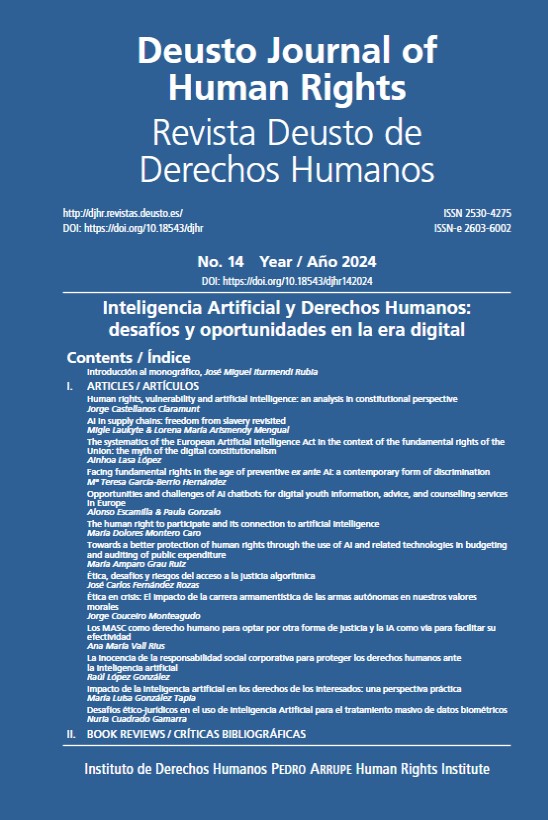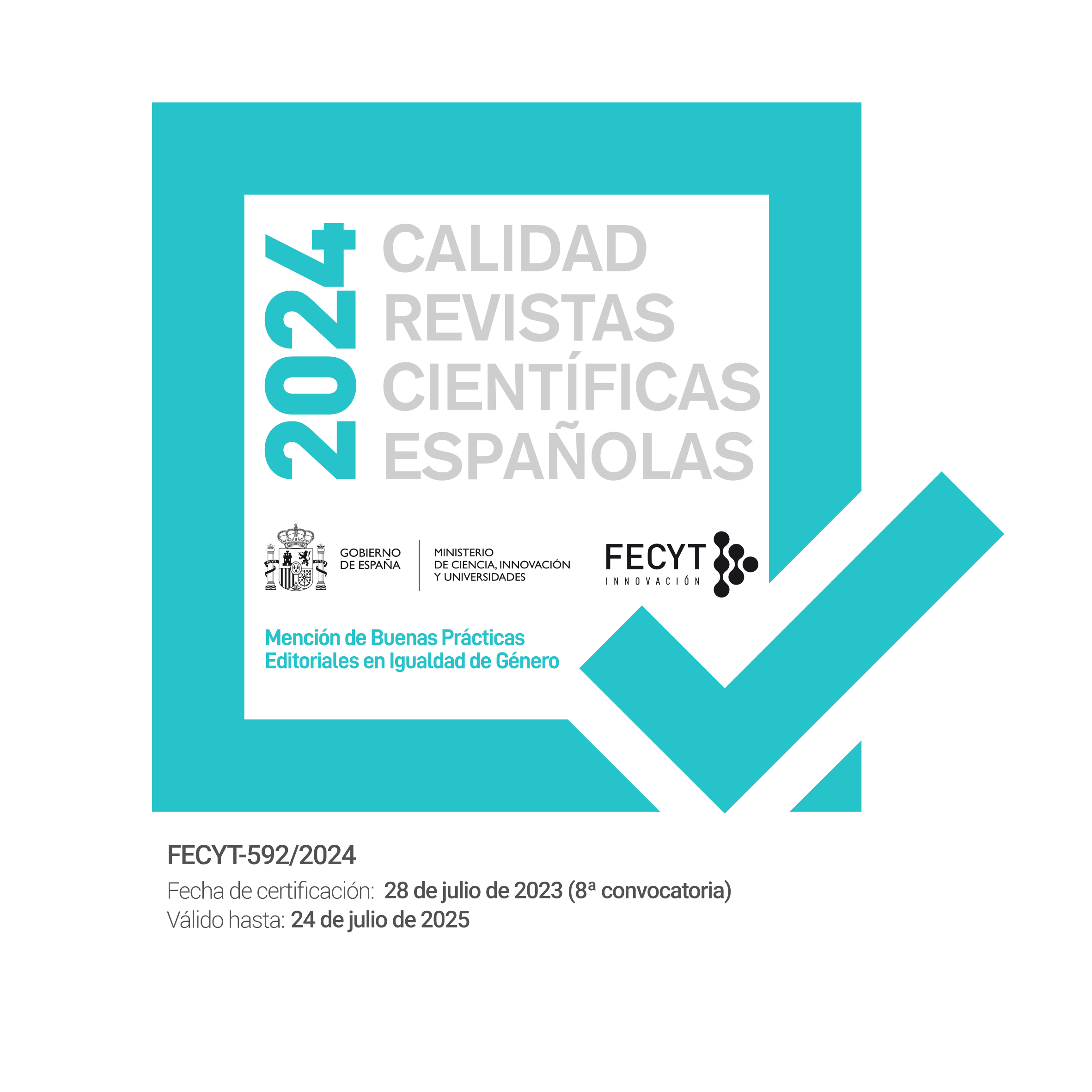IA en las cadenas de suministro: la libertad de la esclavitud revisada
Resumen
El presente trabajo trata el tema de la Inteligencia Artificial (IA) y el derecho humano y fundamental a la libertad de la esclavitud. En particular, enfocamos la esclavitud moderna en las cadenas internacionales de suministros y la posibilidad de utilizar la IA para detectarla. Analizamos la esclavitud y su versión moderna, situamos la IA dentro del debate sobre Derechos Humanos, y tratamos la idea de que ver la IA solo como una herramienta de la violación de Derechos Humanos es limitativo y que hay que explorar más como la IA podría ser útil para identificar las violaciones de los derechos humanos y para ayudarnos a combatirlas. Para lograrlo necesitamos los datos más inclusivos y la supervisión humana, y sostenemos, sin perder de vista el problema de sesgos, que la IA podría ayudar a incrementar la transparencia en las cadenas internacionales de suministros. Concluimos con la importancia del desarrollo de la IA responsable y la necesidad de más esfuerzo regulatorio para proteger este derecho en dichas cadenas.
Recibido: 27 mayo 2024
Aceptado: 12 septiembre 2024
Descargas
Citas
AI Act. 2024. European Parliament legislative resolution of 13 March 2024 on the proposal for a regulation of the European Parliament and of the Council on laying down harmonised rules on Artificial Intelligence (Artificial Intelligence Act) and amending certain Union Legislative Acts (COM(2021)0206 – C9-0146/2021 – 2021/0106(COD)). Accessed May 24, 2024. https://www.europarl.europa.eu/doceo/document/TA-9-2024-0138_EN.html.
Allain, Jean, ed. 2012. The legal understanding of slavery: From the historical to the contemporary. Oxford: Oxford University Press.
Aizenberg, Evgeni and van der Hoeven, Jeroen. 2020. «Designing for the Human Rights in AI», Big Data and Society, 7(2). Accessed May 13, 2024. https://journals.sagepub.com/doi/10.1177/2053951720949566.
Bodendorf, Frank, Fabian Wonn, Kristin Simon and Jörg Franke. 2022. «Indicators and countermeasures of modern slavery in global supply chains: Pathway to a social supply chain management framework» Business Strategy and the Environment 32 (4): 2049–2077. https://doi.org/10.1002/bse.3236.
Bradford, Anu. 2020. The Brussels effect: How the European Union rules the world. Oxford: Oxford University Press.
Brintrup, Alexandra, Edward Kosasih, Philipp Schaffer, Ge Zheng, Guven Demirel y Bart L. MacCarthy. 2023. «Digital supply chain surveillance using artificial intelligence: definitions, opportunities and risks», International Journal of Production Research 62 (13): 4674–4695. https://doi.org/10.1080/00207543.2023.2270719.
Brkan Maja and Grégory Bonnet. 2019. «Legal and technical feasibility of the GDPR’s quest for explanation of algorithmic decisions: of black boxes, white boxes and fata morganas», European Journal of Risk Regulation 11: 18-50.
Crane, Andrew. 2013. «Modern slavery as a management practice: exploring the conditions and capabilities for human exploitation», Academy of Management Review 38 (1): 49-69.
Diaz, Hernan. 2023. Trust. London: Pan Macmillan.
Eco-Business. 2018. «Work with suppliers, not against them, to end modern slavery.» Eco-Business, November 14. Accessed May 27, 2024. https://www.eco-business.com/news/work-with-suppliers-not-against-them-to-end-modern-slavery/.
European Council. 2023. «Human rights by design - future-proofing human rights protection in the era of AI». Accessed May 23, 2024. https://www.coe.int/en/web/commissioner/thematic-work/digital-technologies.
Everett, Susanne and Susanne Keegan. 1997. History of Slavery. Rochester: Grange Books.
Fighting Against Forced Labour and Child Labour in Supply Chains Act 2024. Accessed September 16, 2024. https://laws.justice.gc.ca/eng/acts/F-10.6/.
Fundamental Rights Agency (FRA). 2022. Bias in algorithms - Artificial intelligence and discrimination, Accessed May 23, 2024. https://fra.europa.eu/en/publication/2022/bias-algorithm.
Gold, Stefan, Alexander Trautrims, and Zoe Trodd. 2015. «Modern slavery challenges to supply chain management», Supply Chain Management 20 (5): 485-494. https://doi.org/10.1108/SCM-02-2015-0046.
Greiman, Virginia. 2021. «Human rights and artificial intelligence: a universal challenge», Journal of Information Warfare 20 (1): 50-62.
Han, Chen, Fu Jia, Menggi Jiang, and Lujie Chen. 2022. «Modern slavery in supply chains: a systematic literature review», International Journal of Logistics Research and Applications 27 (7): 1206–27. https://doi.org/10.1080/13675567.2022.2118696.
Haslam, Emily. 2020. The slave trade, abolition and the long history of international criminal law. Oxon: Routledge.
Heys, Alicia. 2023. From conflict to modern slavery: The drivers and the deterrents. Oxford: Oxford University Press.
Howard, Neil. 2016. «Scandal: Inside the global supply chains of 50 top companies». International Trade Union Confederation. Accessed August 25, 2024. https://www.ituc-csi.org/IMG/pdf/pdffrontlines_scandal_en-2.pdf.
International Labor Organization. 2022. Walk free, and International Organization for Migration (IOM), Report on Global Estimates of Modern Slavery. Forced Labour and Forced Marriage, Geneva, September of 2022. Accessed April 22, 2024. https://www.ilo.org/wcmsp5/groups/public/---ed_norm/--ipec/documents/publication/wcms_854733.pdf.
Iturmendi, José M. 2023. «La discriminación algorítmica y su impacto en la dignidad de la persona y los derechos humanos. Especial referencia a los inmigrantes.» Deusto Journal of Human Rights 12: 257-284.
Ivanov, Dimitry, Alexandre Dolgui, and Boris Sokolov. 2019. «The impact of digital technology and industry 4.0 on the ripple effect and supply chain risk analytics», International Journal of Production Research 57 (3): 829- 846.
Jones, Kate. 2023. «AI governance and human rights. Resetting the relationship», Research Paper of Chatham House. Accessed May 12, 2024. https://www.chathamhouse.org/sites/default/files/2023-01/2023-01-10-AI-governance-human-rights-jones.pdf.
Koivisto Ida. 2021. «The digital rear window: Epistemologies of digital transparency», Critical Analysis of Law 8 (1): 64-80.
Landman, Todd. 2020. «Measuring modern slavery: Law, human rights, and new forms of data», Human Rights Quarterly 42 (2): 303-331.
Landman, Todd and Larissa Kersten. 2016. «Measuring and monitoring human rights», in Human Rights: Politics and Practice, edited by Michael Goodhart, 127-144. Oxford: Oxford University Press.
LeBaron, Genevieve and Andreas Rühmkorf. 2017. «Steering CSR through home state regulation: A comparison of the impact of the UK bribery act and modern slavery act on global supply chain governance», Global Policy 8: 15-28.
Legislative Observatory. 2022. 2022/0269(COD). Prohibiting products made with forced labour on the Union market. Accessed August 29, 2024. https://oeil.secure.europarl.europa.eu/oeil/popups/ficheprocedure.do?lang=en&reference=2022/0269(COD).
Li, Peng Lai. 2016. «Natural language processing», Georgetown Law Technology Review 1 (1): 98-104.
Lund-Thomsen, Peter. 2008. «The global sourcing and codes of conduct debate: five myths and five recommendations», Development and Change 39 (6): 1005-1018.
MacCarthy, Bart, Ahmed Wafaa, and Demirel Guven. 2022. «Mapping the supply chain: why, what and how?», International Journal of Production Economics 250 (108688): 1-20. https://doi.org/10.1016/j.ijpe.2022.108688.
Mantelero, Alessandro. 2022. Beyond data: Human rights, ethical and social impact Assessment of AI. Amsterdam: Asser Press.
Mantouvalou, Virginia. 2018. «The UK modern slavery act 2015 three years on», The Modern Law Review 81 (6): 1017–1045.
Meehan, Joanne, and Bruce D. Pinnington. 2021. «Modern Slavery in Supply Chains: Insights Through Strategic Ambiguity», International Journal of Operations & Production Management 41 (2): 77-101.
Melnyk, Steven A., Ram Narasimhan, and Hugo DeCampos. 2013. «Supply chain design: Issues, challenges, frameworks and solutions». International Journal of Production Research 52 (7): 1887–1896.
Modern Slavery Act 2015. Accessed September 16, 2024. https://www.legislation.gov.uk/ukpga/2015/30/contents.
Modern Slavery Act 2018. Accessed September 16, 2024. https://www.legislation.gov.au/C2018A00153/latest/text.
Nersessian, David and Dessislava Pachamanova. 2022. «Human trafficking in the global supply chain: Using machine learning to enhance understanding of corporate disclosures under the UK modern slavery act», Harvard Human Rights Journal 35: 1-46.
New, Steve. 2015. «Modern slavery and the supply chain: the limits of corporate social responsibility?», Supply Chain Management: An International Journal 20 (6): 697-707.
Nicholson, Andrea, Minh Dang, and Zoe Trodd. 2018. «A full freedom: Contemporary survivors’ definitions of slavery», Human Rights Law Review 18 (4): 689–704.
O’Neil, Cathy. 2017. Weapons of math destruction: How big data increases inequality and threatens democracy. London: Penguin Random House.
Pasquale, Frank. 2015. The black box society. London: Harvard University Press.
Quintavalla, Alberto and Jeroen Temperman, eds. 2023. Artificial intelligence and human rights. Oxford: Oxford University Press.
Rogers, Glenn. 2019. A Brief History of World Slavery. Abilene, TX: Simpson & Brook Publishers.
Stevenson, Mark and Rosanna Cole. 2018, «Modern slavery in supply chains: a secondary data analysis of detection, remediation and disclosure», Supply Chain Management 23(2): 81-99.
Tambe, Pratap and Prerna Tambay. 2020. «Reducing modern slavery using AI and blockchain», IEEE / ITU International conference on artificial intelligence for good (AI4G): 22-27.
UK Government Home Office. 2017. Transparency in supply chains, etc. A practical guide. Accessed September 16, 2024. https://assets.publishing.service.gov.uk/media/61b7401d8fa8f5037778c389/Transparency_in_Supply_Chains_A_Practical_Guide_2017_final.pdf.
United Nations. 2024a. Slavery Convention. Adopted September 25, 1926. Accessed May 17, 2024. https://www.ohchr.org/en/instruments-mechanisms/instruments/slavery-convention.
United Nations. 2024b. The International Agreement for the Suppression of the “White Slave Traffic”. Paris, 18 May 1904. Accessed: May 18, 2024. https://treaties.un.org/Pages/ViewDetails.aspx?src=TREATY&mtdsg_no=VII-8&chapter=7&clang=_en.
United Nations. 2022. Mexico: Dark landmark of 100,000 disappearances reflects pattern of impunity, UN experts warn. Statement. Accessed August 29, 2024. https://www.ohchr.org/en/statements/2022/05/mexico-dark-landmark-100000-disappearances-reflects-pattern-impunity-un-experts.
United Nations. 2011. Guiding principles on business and human rights. Accessed May 13, 2024 https://www.ohchr.org/sites/default/files/documents/publications/guidingprinciplesbusinesshr_en.pdf.
United Nations. 2000. Protocol to prevent, suppress and punish trafficking of persons, especially women and children. Accessed August 23, 2024. https://www.ohchr.org/en/instruments-mechanisms/instruments/protocol-prevent-suppress-and-punish-trafficking-persons.
Veale Michael and Irina Brass. 2019. «Administration by algorithm? Public management meets public sector machine learning» In Algorithmic Regulation, edited by Karen Yeung and Martin Lodge, 121-149. Oxford: Oxford University Press.
Weinberg, Nyasha et al, 2020. «AI against modern slavery: Digital insights into modern slavery reporting. Challenges and opportunities», Proceedings of the AAAI Fall Symposium on AI for Social Good Virtual Symposium, CEUR Workshop Proceedings, 2884: 1-8. https://cdn.walkfree.org/content/uploads/2021/05/05173207/20210428-digital-insights-into-modern-slavery.pdf.
Yawar, Sadaat Ali, and Stefan Seuring. 2017. «Management of social issues in supply chains: a literature review exploring social issues, actions and performance outcomes», Journal of Business Ethics 141 (3): 621-643.
Deusto Journal of Human Rights / Revista Deusto de Derechos Humanos es una revista de Acceso Abierto; lo que significa que es de libre acceso en su integridad inmediatamente después de la publicación de cada número. Se permite su lectura, la búsqueda, descarga, distribución y reutilización en cualquier tipo de soporte sólo para fines no comerciales y según lo previsto por la ley; sin la previa autorización de la Editorial (Universidad de Deusto) o la persona autora, siempre que la obra original sea debidamente citada (número, año, páginas y DOI si procede) y cualquier cambio en el original esté claramente indicado. Cualquier otro uso de su contenido en cualquier medio o formato, ahora conocido o desarrollado en el futuro, requiere el permiso previo por escrito de la persona titular de los derechos de autoría.



3.jpg)
3.jpg)
3.jpg)
.jpg)








